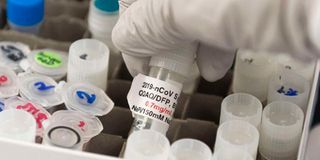Breaking News: KDF chopper crash kills five in West Pokot
Researchers create Covid-19 antibodies from chicken eggs

Scientists say they are now able to produce antibodies capable of treating Covid-19 patients from hen eggs.
What you need to know:
- The antibodies, which are produced in response to the Covid spike protein, are also able to protect the body against a coronavirus attack.
- Ever since the pandemic showed up, scientists around the globe have been working round the clock to come up with methods of protecting the body against the silent killer if not eradicating coronavirus completely.
Scientists say they are now able to produce antibodies capable of treating Covid-19 patients from hen eggs.
The antibodies, which are produced in response to the Covid spike protein, are also able to protect the body against a coronavirus attack.
The scientists from the University of California in the US injected two doses of three coronavirus vaccines into hens then observed them for three to six weeks during which the antibody levels in the hen’s blood were measured routinely.
They then tested the antibodies in laboratory conditions for their ability to fight SARS CoV-2 from infecting human cells and found out that both eggs and sera (plural for serum) from the inoculated hens could recognise the virus. They, however, highlighted that the antibodies from the sera were more effective in fighting the virus.
“In addition to a low cost to produce these antibodies in hens, they can be updated very fast by using updated antigens to hyper immunised hens, allowing protection against current variant strains,” Rodrigo Gallardo, a professor in poultry medicine who was part of the study, said.
He observed that birds produce a kind of antibody named IgY that appears in their sera and eggs, which is akin to that of mammals, including humans.
He added that this antibody does not induce any allergy or immune problem in the human body, which makes it suitable for injection.
The experts disclosed that the antibody retrieval process from hens is fairly cheap as on average, a single hen lays nearly 300 eggs in a year and considering the fact that eggs are readily available, lot of IgY can be harvested.
They, however, pointed out that while their breakthrough will make many breathe a sigh of relief, the egg-based antibody technology required to innoculate humans still requires some work, which is why they have partnered with Stanford University and the University of Technology, Sydney to perfect the technology.
The experts hope to come up with an antibody spray, which will be used on people at high risk of contracting the virus. Ever since the pandemic showed up, scientists around the globe have been working round the clock to come up with methods of protecting the body against the silent killer if not eradicating coronavirus completely.
According to scientists, there are four categories of vaccines in clinical trials and they include whole virus, protein subunit, viral vector and nucleic acid (rna and dna).
Some of them try to smuggle the antigen into the body while others use the body’s own cells to make the viral antigen.
In the past, scientists have found that antibody-like proteins are also present in a shark’s immune system. They are currently working to see how they can use them to combat coronavirus.





